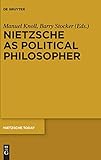Nietzsche as Political Philosopher / ed. by Manuel Knoll, Barry Stocker.
Material type: TextSeries: Nietzsche Today ; 3Publisher: Berlin ; Boston : De Gruyter, [2014]Copyright date: ©2014Description: 1 online resource (478 p.)Content type:
TextSeries: Nietzsche Today ; 3Publisher: Berlin ; Boston : De Gruyter, [2014]Copyright date: ©2014Description: 1 online resource (478 p.)Content type: - 9783110359367
- 9783110377910
- 9783110359459
- online - DeGruyter
- Issued also in print.
| Item type | Current library | Call number | URL | Status | Notes | Barcode | |
|---|---|---|---|---|---|---|---|
 eBook
eBook
|
Biblioteca "Angelicum" Pont. Univ. S.Tommaso d'Aquino Nuvola online | online - DeGruyter (Browse shelf(Opens below)) | Online access | Not for loan (Accesso limitato) | Accesso per gli utenti autorizzati / Access for authorized users | (dgr)9783110359459 |
Browsing Biblioteca "Angelicum" Pont. Univ. S.Tommaso d'Aquino shelves, Shelving location: Nuvola online Close shelf browser (Hides shelf browser)

|

|

|

|

|

|

|
||
| online - DeGruyter Zwischen Heilsgeschichte und säkularer Jurisprudenz : Politische Theologie in den Trauerspielen des Andreas Gryphius / | online - DeGruyter Poetologien des Literaturbetriebs : Szenen bei Kirchhoff, Maier, Gstrein und Händler / | online - DeGruyter Ausgewählte Schriften : Griechisch - deutsch / | online - DeGruyter Nietzsche as Political Philosopher / | online - DeGruyter Antike Lebenswelten : Althistorische und papyrologische Studien / | online - DeGruyter The Ends of Satire : Legacies of Satire in Postwar German Writing / | online - DeGruyter Nationalistische Intellektuelle in der Slowakei 1918-1945 : Kulturelle Praxis zwischen Sakralisierung und Säkularisierung / |
Frontmatter -- Contents -- Abbreviations -- Introduction: Nietzsche as political philosopher -- I. The Variety of Approaches to Nietzsche’s Political Thought -- The “Will to Power”: Towards a Nietzschean Systematics of Moral-Political Divergence in History in Light of the 20th Century -- The Liberatory Limits of Nietzsche’s Colonial Imagination in Dawn 206 -- Nietzsche’s Political Materialism: Diagram for a Nietzschean Politics -- II. Democratic, or Liberal, or Egalitarian Politics in Nietzsche -- Nietzsche on Power and Democracy circa 1876–1881 -- Nietzsche’s Will to Power and Politics -- A Comparison of Friedrich Nietzsche and Wilhelm von Humboldt as Products of Classical Liberalism -- A Nietzschean Case for Illiberal Egalitarianism -- III. Aristocratic, or Anti-Liberal, or Non- Egalitarian Politics in Nietzsche -- Nietzsche, Theognis and Aristocratic Radicalism -- Aristocratic Radicalism as a Species of Bonapartism: Preliminary Elements -- Political and Psychological Prerequisites for Legislation in the Early Nietzsche -- The “Übermensch” as a Social and Political Task: A Study in the Continuity of Nietzsche’s Political Thought -- IV. Ethics, Morality, and Politics in Nietzsche -- Care of Self in Dawn: On Nietzsche’s Resistance to Bio-political Modernity -- “We who are different, we immoralists…” -- Political Realism Naturalized: Nietzsche on the State, Morality, and Human Nature -- The “Last Man” Problem: Nietzsche and Weber on Political Attitudes to Suffering -- V. Physiology, Genealogy, and Politics in Nietzsche -- The Politics of Physiology -- On the Genealogy of Nietzsche’s Values -- Foucault’s use of Nietzsche -- Notes on Contributors -- Name Index -- Subject Index
restricted access online access with authorization star
http://purl.org/coar/access_right/c_16ec
This collection establishes Nietzsche's importance as a political philosopher. It includes a substantial introduction and eighteen chapters by some of the most renowned Nietzsche scholars. The book examines Nietzsche's connections with political thought since Plato, major influences on him, his methodology, and his influence on subsequent thought. The book includes extensive coverage of the debate between radical aristocratic readings of Nietzsche, and more liberal or democratic readings. Close readings of Nietzsche's texts are combined with a contextualising approach to build up a complete picture of his place in political philosophy. Topics include the relevance of Bonapartism and classical liberalism, Nietzsche on Christianity, the cultural history of Germany, the Übermensch, ethics and politics in Nietzsche, and the controversial question of his political preferences and affinities. Nietzsche's political thought is compared with that of Humboldt, Weber and Foucault. The book is essential reading for anyone concerned with Nietzsche's thought, political philosophy, and the history of political ideas.
Issued also in print.
Mode of access: Internet via World Wide Web.
In English.
Description based on online resource; title from PDF title page (publisher's Web site, viewed 28. Feb 2023)


